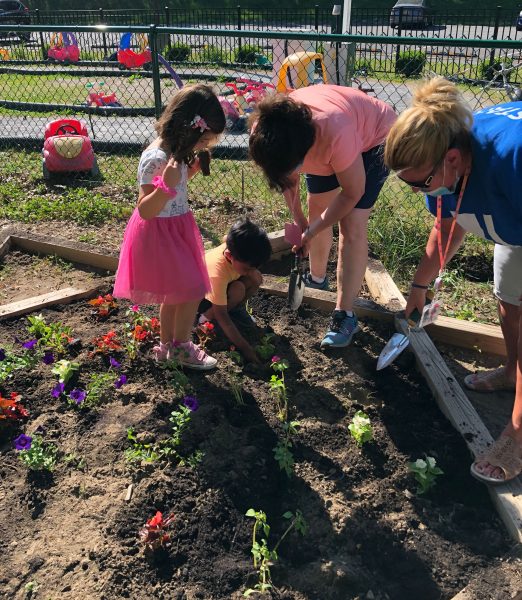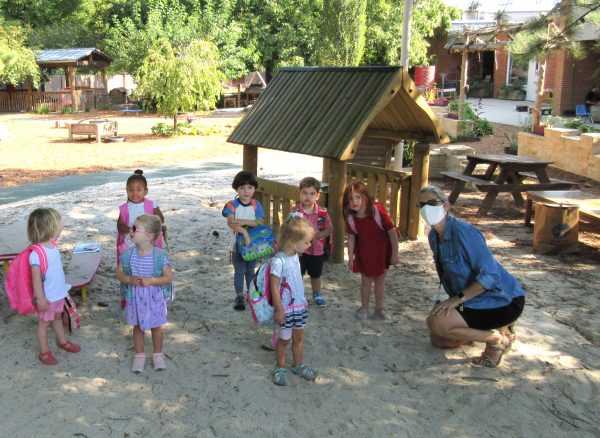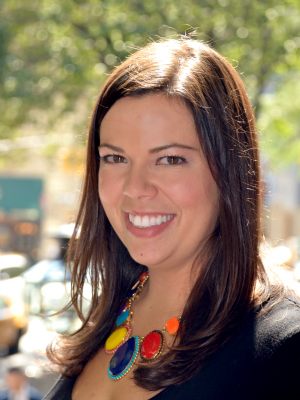By Sarah Koffler
Apples often symbolize educators and generally come to life in autumn, just as schools open for the new academic year. The apple trees bloomed early this year in New Jersey; the trees were heavy with fruit by mid-August. In other years, I easily could have accepted this anomaly of nature as just an oddity, but not this year.
Although the world around us is buzzing with endless viewpoints about teachers, teaching, and all things back-to-school, early childhood educators have been back in the classrooms for months. In fact, some of us never left physically, and none of us ever left emotionally. Throughout the last six months, we’ve been solidly connected to our communities.
Holly Jachera, an educator at the JCC of Central New Jersey in Scotch Plains, New Jersey, reflected that although her time during quarantine was not easy, staying connected to her JCC family was the highlight of her days:
I woke up eagerly in the morning, brushed my hair, and got ready, knowing I’d have 16 little faces on the screen smiling back at me ready to sing, dance, learn, and have fun. It gave me purpose and kept me connected, instead of being isolated.
Our JCC communities mean just as much to our educators as they do to our members. “The JCC is not just a place “to go,” noted Jachera. “It’s a community where we share the same values and look out for each other. I couldn’t wait to get back.”
She wasn’t the only one eager for the physical doors to reopen. In August, 83% of our JCCs’ early childhood centers were up and running, with 95% open as of the beginning of September. This number is expected to increase to 99% by the end of the month. Although some programs are running at lower capacity or have made modifications, none has compromised its beliefs, values, or excellence in any way.
 Emily Hausman, director of the Riverdale Y Early Childhood Center in Bronx, New York, spent the early months of the pandemic running her school virtually and, when the opportunity arose, simultaneously offering emergency childcare for essential workers—medical personnel, transit workers, emergency responders, and others. She didn’t hesitate to step up to the plate to support her community: “This is my school, these people are my neighbors, I see them on the bus, I see them on the street, we hold doors open for each other.” Emily prioritized the importance of being herself, “just as mensch-y and personal, just as much me as I’ve always been and as people have always seen me.”
Emily Hausman, director of the Riverdale Y Early Childhood Center in Bronx, New York, spent the early months of the pandemic running her school virtually and, when the opportunity arose, simultaneously offering emergency childcare for essential workers—medical personnel, transit workers, emergency responders, and others. She didn’t hesitate to step up to the plate to support her community: “This is my school, these people are my neighbors, I see them on the bus, I see them on the street, we hold doors open for each other.” Emily prioritized the importance of being herself, “just as mensch-y and personal, just as much me as I’ve always been and as people have always seen me.”
Emily says she began each day using the Jewish lenses as her guide. (Read an explanation of The Sheva Center’s Jewish lenses.) By viewing others as tzelem Elohim, created in the divine image, she’s been able to reframe her work and experiences. About the essential workers, she says, “Of course they’re stressed. Look at what they are doing!” But, she adds, “when I see everyone in the divine image, I have an automatic relationship to them, elevating the way I think of them. Tzelem Elohim connects us all to each other.” Beyond believing in our values, our JCCs and early childhood educators truly live them. Seeing the world through Jewish lenses inspires every personal and professional aspect of our educators’ lives.
 The lens of b’rit, or covenant and commitment, also has taken on an entirely new meaning during these months. Our educators and leaders remained committed to keeping their communities safe and healthy, provided the level of excellence for which we are known, and guided peers by offering advice based on their own re-entry experiences. Fellow teachers in public schools turned to Emily Vigneaux, a toddler educator at the Boulder JCC in Boulder, Colorado, seeking advice about returning to the classroom. Dive right in, she advised. “Re-entry can be tough, but it’s doable, and we have been doing it all along!”
The lens of b’rit, or covenant and commitment, also has taken on an entirely new meaning during these months. Our educators and leaders remained committed to keeping their communities safe and healthy, provided the level of excellence for which we are known, and guided peers by offering advice based on their own re-entry experiences. Fellow teachers in public schools turned to Emily Vigneaux, a toddler educator at the Boulder JCC in Boulder, Colorado, seeking advice about returning to the classroom. Dive right in, she advised. “Re-entry can be tough, but it’s doable, and we have been doing it all along!”
In addition to connecting with peers—in JCCs and beyond—networking through the Sheva Center has been invaluable for our educators. The masa, or journey, lens teaches us that our individual journeys are reflected in and illuminated by our larger and collective journeys, and, indeed, we are all sharing this journey through our listserv, learning sessions, and virtual gatherings. Donna Peters, early childhood director at the Weinstein JCC in Richmond, Virginia, where she is a longtime employee, conveys her gratitude for the connections the Sheva Center makes possible this way:
Thank you to all the wonderful JCC early childhood directors who have shared guidelines, opening plans, waivers, and their own knowledge. Sharing the journey with each other so bravely and kindly, you have made this process much easier. It is so helpful to have the Sheva Center behind us, helping to keep us moving forward—together.
Yes, the apple trees bloomed early this year, but our JCC educators and early childhood centers prove that we’ve been blooming all along—and will bloom for years to come. In Proverbs, we read: “It is a tree of life to all who grasp it, and whoever holds onto it is happy; its ways are ways of pleasantness, and all its paths are peace.”
May our JCC early childhood centers always be atzei chayim, trees of life, and may they always bloom early and be fruitful.
L’shanah tovah!
 Sarah Koffler is the early childhood education specialist at JCC Association of North America.
Sarah Koffler is the early childhood education specialist at JCC Association of North America.
Looking for other ways to stay connected to the JCC Movement? Sign up below for email updates, including our quarterly newsletter, and visit us on Facebook, Instagram, and Twitter.